Pakistani religious students paint a wall of The Red Mosque in Islamabad, 27 July 2007. Hundreds of Islamists occupied Pakistan's Red Mosque, painting the walls in their original colour and wrecking the official reopening of the complex after a bloody army assault on militants. Protesters chased out a government-appointed religious elder who was meant to lead the first Friday prayers at the Islamabad mosque since the military operation there earlier this month that left more than 100 people dead
ISLAMABAD, PAKISTAN - AUGUST 13: (US NEWS AND WORLD REPORT AND NEWSWEEK OUT) A group of Pakistani women demonstrate outside of the Red Mosque on August 13, 2004, following Friday prayers, in the nation's capital, Islamabad, Pakistan. The women are protesting their Pakistan Army husband's (and father's) arrests for being part of the al Qaeda terrorist network. Al Qaeda has made in-roads into Pakistani institutions and more than a few Army soldiers have been arrested in two or more assassination attempts against President Pervez Musharraf in December, 2003 Abdul Rashid Ghazi, deputy head of the Red Mosque gestures as he announces the release of Chinese hostages during a press conference in Islamabad, 23 June 2007.
A Pakistani masked radical student of The Red Mosque aims an AK-47 assault rifle towards paramilitary soldiers during an exchange of fire outside the mosque in Islamabad, 03 July 2007.
A Pakistani radical students from the Red Mosque holds a molotov cocktail as he runs after setting fire to a government building in Islamabad, 03 July 2007
A Pakistani radical Islamic student throws stones at police outside the Red Mosque in Islamabad, 03 July 2007.
Islamabad, PAKISTAN: Veiled government Pakistani female students of The Red Mosque hold bamboo sticks and shout anti-slogans outside the seminary
Islamabad, PAKISTAN: An armed Pakistani radical student of The Red Mosque wears a gas mask and carries an automatic weapon while taking position behind a wall outside the mosque during an exchange of fire between radical students and paramilitary soldiers in Islamabad, 03 July 2007. Pakistani security forces fought a gunbattle with students from a pro-Taliban mosque in the heart of Islamabad leaving one soldier dead and dozens of female students injured. The fighting erupted after six months of tension over the activities of the hardline Lal Masjid, or Red Mosque, which has kidnapped several Chinese and Pakistani civilians as part of a freelance anti-vice campaign. AFP PHOTO/Aamir QURESHI (Photo credit should read AAMIR QURESHI/AFP/Getty Images)
Pakistani special force commandos carry their automatic weapons as they board on a vehicle near The Red Mosque during a curfew in Islamabad, 04 July 2007.
Islamabad, PAKISTAN: (FILES) In this picture taken 28 March 2007, shows radical Pakistani cleric Abdul Aziz (2-R) surrounded by guards as he stands on a roof of the Lal Masjid or Red Mosque during a protest in Islamabad. Pakistani security forces arrested Aziz, leader of a radical mosque under siege in Islamabad as he tried to flee while disguised in a burqa on 04 July. Aziz was detained as he left the Red Mosque in Islamabad amid a crowd of women wearing similar attire, who were surrendering to the authorities a day after bloody clashes outside the building left 16 people dead.
Islamabad, PAKISTAN: Pakistani policemen frisk a pair of radical Islamic students outside The Red Mosque in Islamabad, 05 July 2007, after their surrender to authorities. Pakistani forces set off 'warning' blasts and smashed down the door of a besieged pro-Taliban mosque prompting militant students to hurl grenades as pressure mounted on them to surrender. The pre-dawn flare-up, which caused no casualties, came hours after the government scored a major coup by arresting the leader of Islamabad's Lal Masjid, or Red Mosque, as he tried to flee disguised in a burqa. Troops and police backed by armoured personnel carriers and helicopters have surrounded the mosque since Tuesday, when clashes started between students and security forces, killing at least 16 people
Islamabad, PAKISTAN: A Pakistani car lifter removes a car damaged during a gun battle in the Red Mosque area in Islamabad, 05 July 2007. The leader of a radical Pakistani mosque was arrested while trying to flee in a woman's burqa as security forces stepped up pressure on a few hundred hardcore followers still holed up inside. Firebrand cleric Abdul Aziz's capture sparked an exodus from Islamabad's Lal Masjid, or Red Mosque, with 1,200 male and female students surrendering to the authorities a day after clashes there left 16 people dead. AFP PHOTO/Farooq NAEEM (Photo credit should read FAROOQ NAEEM/AFP/Getty Images)
Quetta, PAKISTAN: Pakistani students of a madrassa (religious school) chant anti-government slogans as they hold sticks during a protest in Quetta, 05 July 2007, to denounce action against the radical Lal Masjid or Red Mosque in Islamabad. Abdul Rashid Ghazi, the deputy leader of the besieged Red Mosque offered to surrender if he can stay on the premises temporarily with his sick mother -- but the government said he must give up unconditionally. Ghazi said he was willing to hand over the mosque and its affiliated Islamic schools to a government department for religious buildings. AFP PHOTO/Banaras KHAN (Photo credit should read BANARAS KHAN/AFP/Getty Images)
Islamabad, PAKISTAN: A Pakistani Special Forces commando hangs his automatic weapon around his body as he takes position near the Red Mosque in Islamabad, 06 July 2007, during a heavy exchange of fire between paramilitary forces and radical Islamic students. A Pakistani cleric holed up in a besieged mosque in the capital declared he would rather die than surrender, dramatically upping the stakes amid claims human shields are being held inside. Abdul Rashid Ghazi, deputy leader of the pro-Taliban Lal Masjid, or Red Mosque, made the defiant statement on the fourth day of a bloody standoff that has already claimed 19 lives. Heavy gunfire and explosions rocked the mosque early 06 July and there was no call for pre-dawn prayers from the mosque's loudspeakers, indicating the damage inflicted by security forces on the fortified complex.
Islamabad, PAKISTAN: Pakistanis dig graves for the dead militants of the radical Red Mosque at a graveyard in Islamabad, 12 July 2007. Pakistani authorities 12 July examined the bodies of 73 militants killed in a raid on Islamabad's Red Mosque in a bid to discover if any wanted insurgents were among the dead, prior to their mass burial in the capital of Islamabad. Pakistani troops on 11 July cleared the final clutch of diehard extremists from the labyrinthine mosque compound after two days of intense fighting that left at least 73 rebels and nine soldiers dead.
ISLAMABAD, PAKISTAN - JULY 12: A collection of Jihad CDs preaching militant Islam, found inside the destroyed Red Mosque (Lal Masjid) on July 12, 2007 in Islamabad, Pakistan. Government reports indicate that 1 policeman, 10 soldiers and 75 militants were killed in the fighting, including the ring leader, Abdul Rashid Ghazi. The women's seminary inside the mosque became the centre of the battle. The Red Mosque was considered the epicentre of Pakistan's Islamic religious radicals. The violent siege is testing General Pervez Musharraf's credibility as many predict a possible backlash from the religious right.
Lahore, PAKISTAN: Pakistani activists of the hardline six Islamic party alliance, the Muttahida Majlis-e-Amal (MMA), hold an effigy of President Pervez Musharraf with a US flag as they shout slogans during an anti-Musharraf protest rally in Lahore, 13 July 2007, against the military operation against Islamic students in the Red Mosque. Thousands of Islamist protesters vented their fury at Pakistan President Pervez Musharraf at mass rallies some vowing to 'destroy' him to avenge this week's deadly raid on the Red Mosque. Veiled Pakistani women activists of the hardline six Islamic party alliance, the Muttahida Majlis-e-Amal (MMA) carry placards during a demonstration in Islamabad, 24 July 2007, against the government decision to demolish a battle-scarred Islamic girls' school Jamia Hafsa in Islamabad's Red Mosque compound. An army raid on the mosque earlier this month left scores dead with eleven soldiers and more than 75 people killed, most of them militants in Operation Silence.
Pakistani religious students watch as a colleague paints a wall of The Red Mosque in Islamabad, 27 July 2007.
Pakistani policemen gather after taking over The Red Mosque from radical students after a clash in Islamabad, 27 July 2007.
A Pakistani cyclist rides past a line of policemen deployed outside The Red Mosque in Islamabad, 28 July 2007. Pakistan boosted security fearing further attacks a day after a suicide bombing during protests at Islamabad's pro-Taliban Red Mosque killed 14 people. Authorities were investigating how the attacker was able to strike at a crowded market in the heart of the capital, the 13th suicide blast to hit the country since a bloody army raid 10 July, on the mosque in the Pakistani capital. AFP PHOTO/Aamir QURESHI (Photo credit should read AAMIR QURESHI/AFP/Getty Images)
PAKISTAN - JULY 03: A masked student of Lal Masjid, or red mosque, brandishes an assault rifle from a sand-bag bunker in Islamabad, Pakistan, on Tuesday, July 3, 2007. A Pakistani paramilitary officer was among three people killed in gunfire exchanged between police and students of the Red Mosque in Islamabad today, three months after the chief cleric said he wanted to impose Islamic law in the capital. A Pakistani man weeps as he listens to a sermon by Red Mosque chief cleric Maulana Abdul Aziz (not seen) during Friday prayers in Islamabad on July 10, 2009, the second anniversary of a military assault on the mosque. Government forces surrounded the mosque on July 3, 2007 following a clash between police and Al-Qaeda-linked militants who had been using it as a base for an Islamic vigilante campaign in Islamabad. On July 10, 2007, army commandos stormed the building and an adjacent girls' school, an action that left more than 100 people dead. The mosque operation unleashed a wave of revenge bombings across Pakistan that have since killed around 2,000 people. Attacks are now part of daily life. AFP
Pakistani Muslims offer Eid al-Fitr prayers outside the Red Mosque during the first day of their religious festival in Islamabad on September 11, 2010.
Maj. Gen. Waheed Arshad shows journalists an array of weapons, gas masks and jihadist literature found at Lal Masjid, the Red Mosque, in Islamabad in the aftermath of heavy fighting this week, July 12, 2007.
A Pakistani soldier stands in front of piles of spent AK-47 ammunition, AK-47s and ammunition clips found at Lal Masjid, the Red Mosque, in Islamabad in the aftermath of heavy fighting this week, July 12, 2007 Abdul Rashid Ghazi, a senior cleric at Islamabad's Lal Masjid, sits at his desk, June 21, 2007. Ghazi has called for the installation of a hard line Islamic government in Pakistan
Chief cleric of Red Mosque, Maulana Abdul Aziz talks to the media during a news conference in Islamabad on March 26, 2013. Aziz, on March 26 demanded that the government immediately arrest former president Pervez Musharraf and put him on trial for killing hunderds of innocent people. 'Musharraf should be brought to justice and awarded stern punishment' for crimes against humanity, said Maulana Abdul Aziz, who was captured during the 2007 siege of a radical mosque in Islamabad, ordered by Musharraf. The operation left more than 100 people dead and opened the floodgates to a Taliban-led insurgency in Pakistan, which has killed thousands of people. Musharraf on Sunday returned to Pakistan, ending more than four years in self-imposed exile, to contest historic general elections due on May 11. AFP PHOTO/AAMIR QURESHI (Photo credit should read AAMIR QURESHI/AFP/Getty Images)
Chief cleric of Islamabad's Red Mosque, Maulana Abdul Aziz (R), a member of a committee from Tehreek-e-Taliban Pakistan (TTP) which was set up to hold talks with the government of Pakistan, arrives to attend a meeting in Islamabad on February 4, 2014. Negotiators for the Pakistani Taliban said that government representatives had refused to show up for planned peace talks, citing confusion over the militants' team. The two sides had been due to gather in Islamabad at 2:00 pm (0900 GMT) to chart a 'roadmap' for talks, amid a surge in militant violence and scepticism about the chances of reaching a negotiated peace





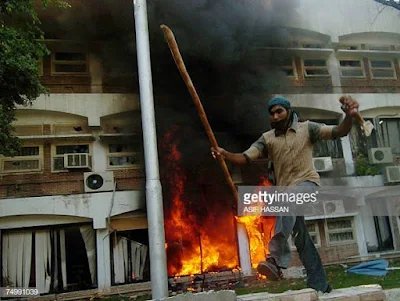








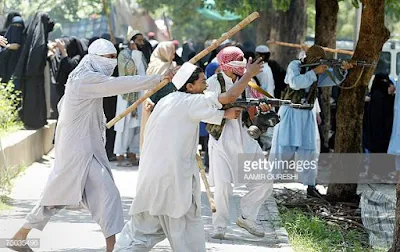
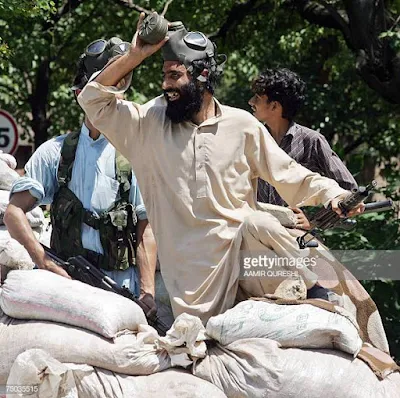




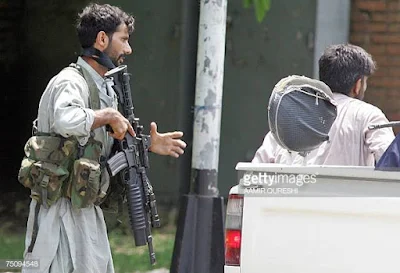



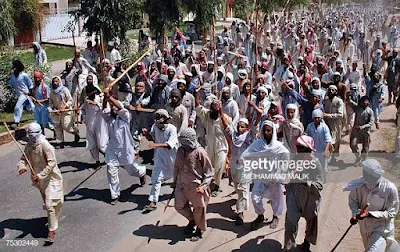



















No comments:
Post a Comment